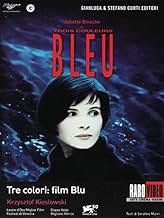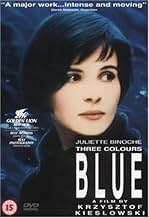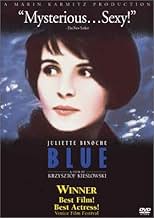Trois couleurs: Bleu
- 1993
- Tous publics
- 1h 38m
A woman struggles to find a way to live her life after the death of her husband and child.A woman struggles to find a way to live her life after the death of her husband and child.A woman struggles to find a way to live her life after the death of her husband and child.
- Awards
- 22 wins & 19 nominations total
Benoît Régent
- Olivier
- (as Benoit Regent)
Charlotte Véry
- Lucille
- (as Charlotte Very)
Hélène Vincent
- La journaliste
- (as Helene Vincent)
Yann Trégouët
- Antoine
- (as Yann Tregouet)
Featured reviews
Krzysztof Kieslowski is, unquestionably, the master of the visual narrative.
More-so than even La Double Vie de Veronique (which is much more poetic than linear in it's structure), Trois Couleurs: Bleu is a marvel of visual exposition. Due to the nature of the film, exposition in this case is not necessarily related to plot, but rather to the understanding of a human being.
Kieslowski delves so deeply into the true nature of Julie (Juliette Binoche) and in such a remarkable way that by the end of the film we understand her utterly. Free from the clutter of dialogue and, for the most part, interaction with other characters we see Julie alone and in her most natural state. Kieslowski takes his documentary background and conveys his character in an almost voyeuristic manner. Showing Julie in anything but a state of solitude would be false; due to human nature Julie with Oliver would not be Julie, but rather a reflection of her true self which, although certainly interesting, pales in comparison to observing her silently struggle with the death of her husband and daughter alone.
Kieslowski played with applying the documentary techniques, which he perfected in his early work, to the narrative form in The Dekalog with tremendous, although at times visually mundane, results. The Dekalog looks like a documentary. Here, he turns over much visual control to his Director of Photographer, Slawomir Idziak, with tremendously cinematic results. Idziak's use of color and light, combined with his groundbreaking filter work, serve to further explore Julie's character. Blue feels like a documentary and looks like a dismal Rembrandt. While Kieslowski concentrates on showing the true nature of Julie through action, Idziak contributes by showing her through light and color.
Trois Couleurs: Blue is an almost unmatched achievement in the history of cinema. Never before has a character been conveyed so splendidly and in such a visually stunning manner.
More-so than even La Double Vie de Veronique (which is much more poetic than linear in it's structure), Trois Couleurs: Bleu is a marvel of visual exposition. Due to the nature of the film, exposition in this case is not necessarily related to plot, but rather to the understanding of a human being.
Kieslowski delves so deeply into the true nature of Julie (Juliette Binoche) and in such a remarkable way that by the end of the film we understand her utterly. Free from the clutter of dialogue and, for the most part, interaction with other characters we see Julie alone and in her most natural state. Kieslowski takes his documentary background and conveys his character in an almost voyeuristic manner. Showing Julie in anything but a state of solitude would be false; due to human nature Julie with Oliver would not be Julie, but rather a reflection of her true self which, although certainly interesting, pales in comparison to observing her silently struggle with the death of her husband and daughter alone.
Kieslowski played with applying the documentary techniques, which he perfected in his early work, to the narrative form in The Dekalog with tremendous, although at times visually mundane, results. The Dekalog looks like a documentary. Here, he turns over much visual control to his Director of Photographer, Slawomir Idziak, with tremendously cinematic results. Idziak's use of color and light, combined with his groundbreaking filter work, serve to further explore Julie's character. Blue feels like a documentary and looks like a dismal Rembrandt. While Kieslowski concentrates on showing the true nature of Julie through action, Idziak contributes by showing her through light and color.
Trois Couleurs: Blue is an almost unmatched achievement in the history of cinema. Never before has a character been conveyed so splendidly and in such a visually stunning manner.
An accident results in loss and pain, the rejection of a world that you refrain, you seek withdrawal, isolation, segregation, separation, and transition to a life, where you abstain. But seclusion still has links and ties and cords, that retract and pull and cannot be ignored, reconnection through a box, reveals a secret that's unlocked, that begins to reconnect, and to restore.
It's a wonderful performance from Juliette Binoche as she elegantly weaves Kieslowski's tale of freedom into a contemporary setting. Packed full of symbolism that requires numerous visits to absorb, you may find a myriad of interpretations of your own too.
It's a wonderful performance from Juliette Binoche as she elegantly weaves Kieslowski's tale of freedom into a contemporary setting. Packed full of symbolism that requires numerous visits to absorb, you may find a myriad of interpretations of your own too.
How do we know what it is, essentially, that we liked about a movie? Which is to say, what do we come to know about this viewer who was affected? And what do we say of that experience, do we ascribe it outside of us? No, that's just a bunch of words.
This is what we have here, questions of memory and meaning. A woman as viewer of a movie taking spontaneous shape around her (played by Binoche as placid observer), that pokes holes in herself and provokes questions; finally overcoming it by being pulled forward by what was left incomplete in it.
A woman who has lost everything as the film begins, every anchor in her life violently removed in one swoop and she's now cast adrift. We have the whole film as her own inner drift through an interminable flow. Kieslowski evokes this with lush dissonance between visual segments, cuts and fades that leave life in suspense. There is scant story, all about living with these fragments. Music erupts around her in sudden intervals; but music that's coming from inside of her and being hallucinated.
It's the world of memory and inner life. Tarkovsky enters this with long, mystifying sweeps of the camera that lift bearings and slip into dreams and ruminations. Kieslowski by contrast caresses their outline, the surface of emotions as they glide over the eyes. It's not difficult like Tarkovsky or Ruiz can be, but pleasant in the way of Kar Wai. It goes down rather easy, you can see it for just the surface shift.
Kieslowski had spent the whole 10 hours of the Dekalog training this ability to dream in advance. It pays off here. Each of the 10 Dekalogs was about a narrative that an earth-shattering revelation comes along and creates a change in viewing. You will see this here obviously. But Dekalog had a contrast; some of it was Kieslowski opening corridors in the imagining with his camera, most was characters stumbling into revelations and articulating feelings. Here I'm happy to note this tension is resolved in favor of the eye; the whole is about visual slippage through cracks in story.
He lets blue lights shine on screen as music soars in crescendos, he gives us closeup shots of eyes; the eye that colors. At other points he introduces memory as images before a viewer: the funeral playing on a screen, images of her husband on TV that when shuffled through reveal a mistress. Most eloquently, images on TV of someone being cast over a void with a bungee chord as her anxiously precarious drift with nowhere to hold. She's fading from even the mind of her mother.
For the end he reserves a tableaux of joined moments from lives as they are suspended briefly in mind. It's all being endlessly relived and combined like the music she works to complete with her composer friend. The music is central here.
Not just as the memory of what was collaboratively lived with her composer husband, the emotion that was absorbed and now erupts again, but also as the sheet where an incomplete piece beckons for the work of continued imagination. The shot of this sheet as scribbled notes end and lines stretch interminably is the abstract heart at the bottom of it.
Had another woman not made a copy of the score, it would have disappeared when she burnt it. Had she come by to pick up the photos of her husband, she might have burnt them with everything else and never found out about the mistress. But it's all this what eventually pulls her out of herself.
This is what we have here, questions of memory and meaning. A woman as viewer of a movie taking spontaneous shape around her (played by Binoche as placid observer), that pokes holes in herself and provokes questions; finally overcoming it by being pulled forward by what was left incomplete in it.
A woman who has lost everything as the film begins, every anchor in her life violently removed in one swoop and she's now cast adrift. We have the whole film as her own inner drift through an interminable flow. Kieslowski evokes this with lush dissonance between visual segments, cuts and fades that leave life in suspense. There is scant story, all about living with these fragments. Music erupts around her in sudden intervals; but music that's coming from inside of her and being hallucinated.
It's the world of memory and inner life. Tarkovsky enters this with long, mystifying sweeps of the camera that lift bearings and slip into dreams and ruminations. Kieslowski by contrast caresses their outline, the surface of emotions as they glide over the eyes. It's not difficult like Tarkovsky or Ruiz can be, but pleasant in the way of Kar Wai. It goes down rather easy, you can see it for just the surface shift.
Kieslowski had spent the whole 10 hours of the Dekalog training this ability to dream in advance. It pays off here. Each of the 10 Dekalogs was about a narrative that an earth-shattering revelation comes along and creates a change in viewing. You will see this here obviously. But Dekalog had a contrast; some of it was Kieslowski opening corridors in the imagining with his camera, most was characters stumbling into revelations and articulating feelings. Here I'm happy to note this tension is resolved in favor of the eye; the whole is about visual slippage through cracks in story.
He lets blue lights shine on screen as music soars in crescendos, he gives us closeup shots of eyes; the eye that colors. At other points he introduces memory as images before a viewer: the funeral playing on a screen, images of her husband on TV that when shuffled through reveal a mistress. Most eloquently, images on TV of someone being cast over a void with a bungee chord as her anxiously precarious drift with nowhere to hold. She's fading from even the mind of her mother.
For the end he reserves a tableaux of joined moments from lives as they are suspended briefly in mind. It's all being endlessly relived and combined like the music she works to complete with her composer friend. The music is central here.
Not just as the memory of what was collaboratively lived with her composer husband, the emotion that was absorbed and now erupts again, but also as the sheet where an incomplete piece beckons for the work of continued imagination. The shot of this sheet as scribbled notes end and lines stretch interminably is the abstract heart at the bottom of it.
Had another woman not made a copy of the score, it would have disappeared when she burnt it. Had she come by to pick up the photos of her husband, she might have burnt them with everything else and never found out about the mistress. But it's all this what eventually pulls her out of herself.
Blue is one of those little movies that grows on you. The more you think about it the more you like it. That's not to say that it's not enjoyable to view; the cinematography and music are marvelous. But this is Juliette Binoche's movie. Everything revolves around her character, Julie, who, in the first scene, survives an automobile accident that claims the lives of her famous composer husband and her five-year-old daughter. Now alone the remainder of the movie delves into Julie's long emotional recovery. Not traumatic, or depressing as the subject matter may imply it is instead subtle, graceful, and beautiful.
Often times when viewing an intelligent film like this I have to really contemplate what the implications the film maker making mean to me. This film was no exception. Kieslowski, with his background in non-fiction film making, is applying the french political value of liberty to a personal situation. He is, in essence, studying the human condition through fiction. The meaning of "liberty" takes on a very different meaning for Julie in this film. She tries to gain liberty from her memories and her emotions only to find that it is an impossible task. This is not a film to casually throw on after supper. This film requires a commitment by the audience to really consider Kieslowski's implications, for he is telling us (throughout this trilogy) what he thinks makes a "good" person. The score is beautiful and has a character of its own in the plot. A must see for true film lovers but perhaps a little too much for someone expecting a casual encounter.
Did you know
- TriviaAt the 2018 Visegrad Film Forum, cinematographer Slawomir Idziak claimed that the script and initial cut of this film focused on the journalist character (played by Hélène Vincent) and her efforts to investigate the authorship of the unfinished musical composition that drives the plot. It was only during the editing process that director Krzysztof Kieslowski re-structured the film to focus on Julie (played by Juliette Binoche).
- GoofsWhen Oliver tells Julie he will not incorporate her changes into the musical score, a boom mic is visible briefly as Julie puts down the phone.
- Quotes
Julie Vignon: Now I have just one thing left to do: nothing. I want no possessions, no memories, no friends, no lovers -- they're all traps.
- Crazy creditsThe final credit says in French, "We thank Alfa Romeo who allowed the scene of the accident to the Alfa 164 whose dynamics are of course purely imaginary."
- ConnectionsFeatured in The 51st Annual Golden Globe Awards (1994)
- How long is Three Colors: Blue?Powered by Alexa
Details
- Release date
- Countries of origin
- Official site
- Languages
- Also known as
- Bleu
- Filming locations
- Palais de Justice, Paris 1, Paris, France(hall of justice)
- Production companies
- See more company credits at IMDbPro
Box office
- Gross US & Canada
- $1,324,974
- Opening weekend US & Canada
- $6,413
- Dec 5, 1993
- Gross worldwide
- $1,554,108
- Runtime
- 1h 38m(98 min)
- Color
- Sound mix
- Aspect ratio
- 1.85 : 1
Contribute to this page
Suggest an edit or add missing content

![Watch Bande-annonce [OV]](https://m.media-amazon.com/images/M/MV5BZGFhMTA5ODQtM2Q4OC00NTI0LTkyYjgtMGViODA0YWZjZmI3XkEyXkFqcGdeQXRyYW5zY29kZS13b3JrZmxvdw@@._V1_QL75_UX500_CR0)
![Three Colors: Blue: The Criterion Collection [Blu-ray]](https://m.media-amazon.com/images/M/MV5BZThmZGMzY2EtZTdiNy00NjMwLTk1YTQtOTVlNGIxYjRhZGYzXkEyXkFqcGdeQXVyNzU1NzE3NTg@._V1_QL75_UX500_CR0)































